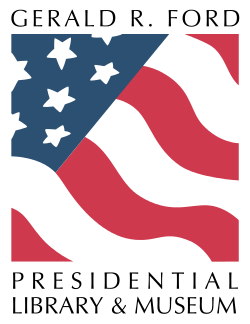| Gerald R. Ford Presidential Library | |
|---|---|
 | |
 | |
| General information | |
| Location | Ann Arbor, Michigan, United States |
| Coordinates | 42°17′16″N83°42′45″W / 42.28781°N 83.712516°W |
| Named for | Gerald R. Ford |
| Construction started | January 15, 1979 |
| Inaugurated | Dedicated on April 27, 1981 |
| Cost | $4.3 million |
| Management | National Archives University of Michigan |
| Technical details | |
| Size | 50,000 square feet (4,600 m2) |
| Website | |
| Ford Library | |
| ||
|---|---|---|
Pre-vice presidency 40th Vice President of the United States 38th President of the United States Policies Tenure Post-presidency  | ||
The Gerald R. Ford Presidential Library is a repository located on the north campus of the University of Michigan in Ann Arbor. [1] The library houses archival materials on the life, career, and presidency of Gerald Ford, the president of the United States from 1974 to 1977. [2] The Gerald R. Ford Presidential Library is a part of the National Archives and Records Administrations presidential library system.



